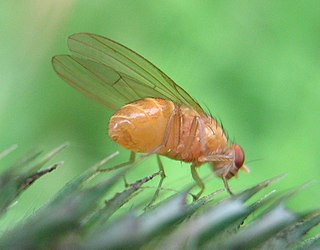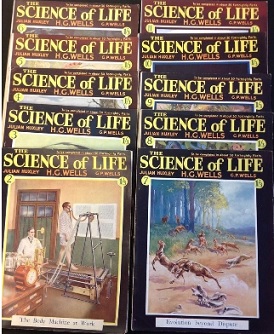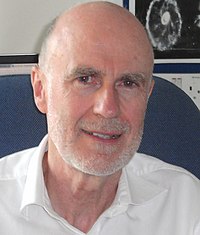
Biology – The natural science that studies life. Areas of focus include structure, function, growth, origin, evolution, distribution, and taxonomy.

Theodosius Grigorievich Dobzhansky was an American geneticist and evolutionary biologist. He was a central figure in the field of evolutionary biology for his work in shaping the modern synthesis and also popular for his support and promotion of theistic evolution as a practicing Christian. Born in the Russian Empire, Dobzhansky immigrated to the United States in 1927, aged 27.

Sir Julian Sorell Huxley was a British evolutionary biologist, eugenicist, and internationalist. He was a proponent of natural selection, and a leading figure in the mid-twentieth century modern synthesis. He was secretary of the Zoological Society of London (1935–1942), the first director of UNESCO, a founding member of the World Wildlife Fund, the president of the British Eugenics Society (1959–1962), and the first president of the British Humanist Association.

John Stephen JonesDSc FLSW is a British geneticist and, from 1995 to 1999 as well as from 2008 to June 2010, was Head of the Department of Genetics, Evolution and Environment at University College London. His studies are conducted in the Galton Laboratory.
Cyril Dean Darlington was an English biologist, cytologist, geneticist, and eugenicist. He discovered the mechanics of chromosomal crossover, its role in inheritance, and thus its importance to evolution. He was the Sherardian Professor of Botany at the University of Oxford from 1953 to 1971.
Electromagnetic theories of consciousness propose that consciousness can be understood as an electromagnetic phenomenon.

The Science of Life is a book written by H. G. Wells, Julian Huxley and G. P. Wells, published in three volumes by The Waverley Publishing Company Ltd in 1929–30, giving a popular account of all major aspects of biology as known in the 1920s. It has been called "the first modern textbook of biology" and "the best popular introduction to the biological sciences". Wells's most recent biographer notes that The Science of Life "is not quite as dated as one might suppose".

What Is Life? The Physical Aspect of the Living Cell is a 1944 science book written for the lay reader by physicist Erwin Schrödinger. The book was based on a course of public lectures delivered by Schrödinger in February 1943, under the auspices of the Dublin Institute for Advanced Studies, where he was Director of Theoretical Physics, at Trinity College, Dublin. The lectures attracted an audience of about 400, who were warned "that the subject-matter was a difficult one and that the lectures could not be termed popular, even though the physicist’s most dreaded weapon, mathematical deduction, would hardly be utilized." Schrödinger's lecture focused on one important question: "how can the events in space and time which take place within the spatial boundary of a living organism be accounted for by physics and chemistry?"
Niall Shanks was an English philosopher and critic of intelligent design.
The quantum mind or quantum consciousness is a group of hypotheses proposing that local physical laws and interactions from classical mechanics or connections between neurons alone cannot explain consciousness, positing instead that quantum-mechanical phenomena, such as entanglement and superposition that cause nonlocalized quantum effects, interacting in smaller features of the brain than cells, may play an important part in the brain's function and could explain critical aspects of consciousness. These scientific hypotheses are as yet unvalidated, and they can overlap with quantum mysticism.

Jameel Sadik "Jim" Al-Khalili is an Iraqi-British theoretical physicist, author and broadcaster. He is professor of theoretical physics and chair in the public engagement in science at the University of Surrey. He is a regular broadcaster and presenter of science programmes on BBC radio and television, and a frequent commentator about science in other British media.
Quantum biology is the study of applications of quantum mechanics and theoretical chemistry to aspects of biology that cannot be accurately described by the classical laws of physics. An understanding of fundamental quantum interactions is important because they determine the properties of the next level of organization in biological systems.

Quantum Aspects of Life, a book published in 2008 with a foreword by Roger Penrose, explores the open question of the role of quantum mechanics at molecular scales of relevance to biology. The book contains chapters written by various world-experts from a 2003 symposium and includes two debates from 2003 to 2004; giving rise to a mix of both sceptical and sympathetic viewpoints. The book addresses questions of quantum physics, biophysics, nanoscience, quantum chemistry, mathematical biology, complexity theory, and philosophy that are inspired by the 1944 seminal book What Is Life? by Erwin Schrödinger.
Universal Darwinism, also known as generalized Darwinism, universal selection theory, or Darwinian metaphysics, is a variety of approaches that extend the theory of Darwinism beyond its original domain of biological evolution on Earth. Universal Darwinism aims to formulate a generalized version of the mechanisms of variation, selection and heredity proposed by Charles Darwin, so that they can apply to explain evolution in a wide variety of other domains, including psychology, linguistics, economics, culture, medicine, computer science, and physics.
Ancon sheep were a grouping of domestic sheep with long bodies and very short legs, with the fore-legs being crooked. The term is generally applied to a line of sheep bred from a single affected lamb born in 1791 in Massachusetts, USA. The breed was artificially selected and maintained for its desirable inability to jump over fences. It was allowed to go extinct in 1876 when it was no longer required.
Several universities have designed interdisciplinary courses with a focus on human biology at the undergraduate level. There is a wide variation in emphasis ranging from business, social studies, public policy, healthcare and pharmaceutical research.

Quantum Night is a 2016 science-fiction thriller novel written by Canadian novelist Robert J. Sawyer. Set in 2020, the book touches on themes of quantum physics, psychology, current politics and ethics.

The Ladybird Expert books is a series of titles for an adult readership intended to provide clear, accessible and authoritative introductions, informed by expert opinion, to key subjects drawn from science, history and culture.










